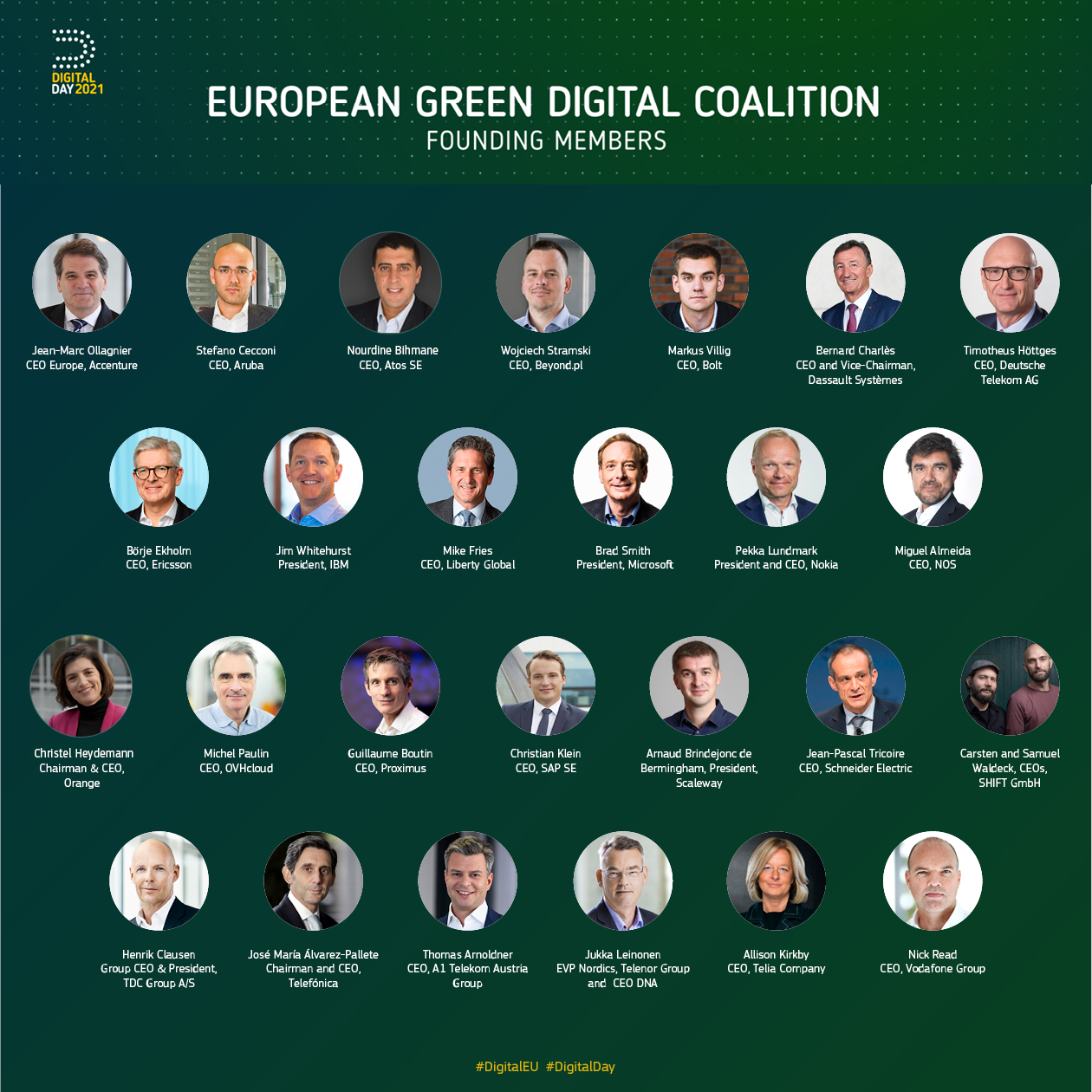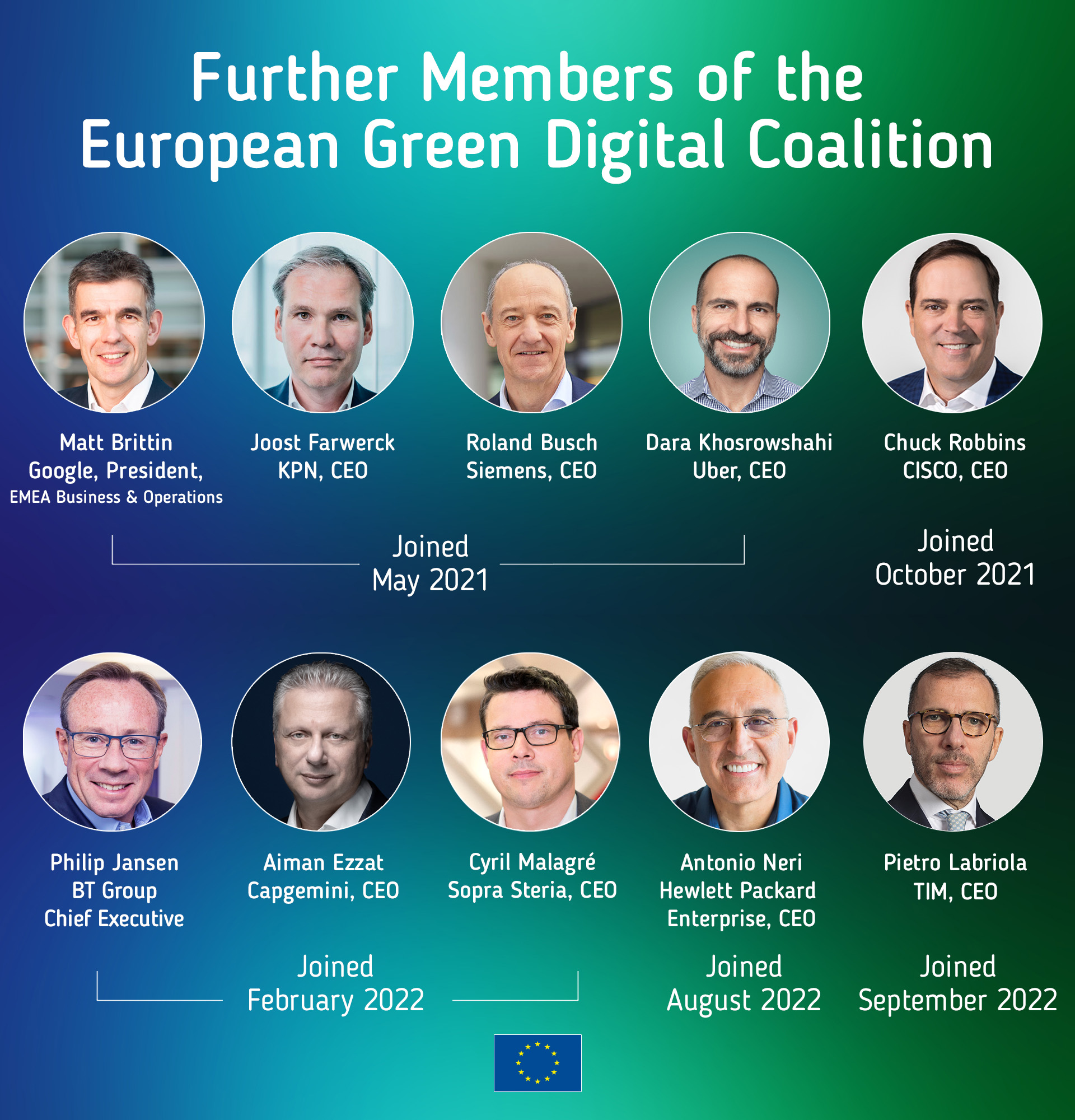The European Green Digital Coalition is a group of companies committed to supporting the Green and Digital Transformation of the EU.
The European Green Digital Coalition (EGDC) currently has 37 members and 14 supporting partners. It was founded by 26 CEOs of ICT companies who signed a Declaration to support the Green and Digital Transformation of the EU on Digital Day 2021.
The Declaration builds on the EU Council conclusions of December 2020 on Digitalisation for the benefit of the environment and recognises the ICT sector as a key player in the fight against climate change.
Signatories of the declaration commit on behalf of their companies to take action in the following 3 areas:
- Investing in the development and deployment of green digital solutions with significant energy and material efficiency that achieve a net positive impact in a wide range of sectors
- Developing methods and tools to measure the net impact of green digital technologies on the environment and climate by joining forces with NGOs and relevant expert organisations
- Co-creating, with representatives of others sectors, recommendations and guidelines for green digital transformation of these sectors that benefits environment, society and economy

The main aim of the EGDC is to maximise the sustainability benefits of digitalisation. For example, by reducing and avoiding more emissions than the footprint of the ICT sector itself.
This will accelerate the sustainable and circular transitions of the sector, while contributing to an innovative, inclusive and resilient digital society. The EGDC does not represent a 'green pledge of the ICT sector' and is not an end in and of itself.
The EGDC members will work closely with the European Commission and others to deliver on their commitments and will report regularly on progress made.
European Parliament Pilot Project
Through the ‘European Parliament Pilot Project European Green Digital Coalition’, a consortium was set up to support the EGDC in its work to define science–based methods to estimate the reduction and avoidance of greenhouse gas (GHG) emissions by specific ICT solutions in different sectors, and to support a green digital transformation of sectors such as energy, transport, agriculture, and construction.
The project, led by the Global Enabling Sustainability Initiative (GeSI), brought together key ICT Associations including the European DIGITAL SME Alliance, DIGITALEUROPE, ETNO, and the GSMA. It worked with other expert organisations such as the Carbon Trust, Deloitte and Sustainable ICT, and EGDC members to develop the science-based methodologies, which were published in April 2024.
The publications include 3 documents:
- A Net Carbon Impact Assessment Methodology for ICT solutions, which enables us to assess the positive contribution and direct footprint of a given ICT solution in CO2 emissions. It is complemented by sector-specific methodologies.
- Real life case-studies, which were used to develop calculators to measure the net environmental impact of ICT solutions. These range from cloud-based tools for energy management in buildings to 5G-enabled manufacturing and agriculture, to smart energy and smart city platforms.
- Deployment guidelines, which were formulated to enhance sectoral understanding of the deployment of ICT solutions and provide guidance on optimising their positive impact.
Membership and supporting partners
The EGDC is open to interested companies. For a company to become a member of the EGDC, the executive leader of the company (CEO or President) needs to sign the declaration committing to the above actions and confirming that the company:
- has submitted or will submit shortly a sustainability pledge that is monitored by an independent organisation and publicly reported;
- has established science-based targets for reducing GHG emissions by 2030 aligned with the 1.5°C climate trajectory;
- will become climate neutral or net-zero no later than 2040.
Members of the Coalition commit to make available staff and resources to work towards the actions of the Declaration. They will be called on to work on methodologies and standards together with relevant expert organisations and stakeholders.
Companies will also work together to co-create deployment guidelines and recommendations for green digital solutions in different sectors that are beneficial to the environment and climate according to the defined metrics.
Interested companies that fulfil the criteria (.pdf) can contact the Secretariat of the EGDC.
In the case of SMEs, the Digital SME Alliance provides assistance. Forty-five SMEs and start-ups support the EGDC and have signed the Declaration.
Associations, public and private organisations, who are willing to actively and voluntarily contribute to the achievement of the objectives of the European Green Digital Coalition, are now invited to become EGDC Supporting Partners.
Four new members joined the EGDC ahead of the Digital Assembly in June 2021:
- Google, Matt Brittin, President, EMEA Business and Operations
- KPN, Joost Farwerck, CEO
- Siemens, Roland Busch, CEO
- Uber, Dara Khosrowshahi, CEO
Since then, further members have also joined:
- Cisco, Chuck Robbins, CEO
- BT Group, Philip Jansen, CEO
- Capgemini, Aiman Ezzat, CEO
- Sopra Steria, Cyril Malagré, CEO
- Hewlett Packard Enterprise, Antonio Neri, CEO
Background
ICT solutions are products or services that combine digital networks, technologies and applications. ‘Green Digital Solutions’ are ICT solutions that contribute positively to environmental & climate targets. For example, by contributing to reduction or avoidance of GHG emissions many times more than the own footprint of these ICT solutions.
Digitalisation can also accelerate the transition to circular economy, such as by tracking, tracing and optimising the use of natural resources and enabling new sustainable business models, while supporting the resilience of our economy.
While the sustainability transition can benefit from digitalisation, the sustainability transition can in turn drive digital innovation and provide new opportunities for the digital industry to innovate and to become more competitive.
The transition to a circular economy requires the creation of new digitally-enabled sustainable business models and opportunities in the EU where the first movers can harness the gains on global markets.
This synergy between the green transition and digitalisation is the essence of the green digital transformation, leading to societal, environmental and economic benefits.
While methods of estimating the ICT sector’s carbon footprint are becoming standardised, the methods to measure ICT enablement – tools and processes that support the digital transformation – still vary widely.
Consistent and comparable assessment methods, such as indicators, metrics, and KPIs would be a welcome development for private and public investors. Such methods could be used by EU Taxonomy, public and private development and innovation funds, Green public and private procurers and more.
The lack of such indicators can results in:
- lost opportunities for financing the development and deployment of green digital solutions;
- obstacles to wider adoption by Member States and regions to use Green Public procurements for ICT enabled solutions;
- lack of credible evidence for by policy makers planning the green and digital twin transition.
To improve the understanding of different sectors on how best to proceed with the green digital twin transition, EGDC aims to promote and enable cross-sectoral dialogues. This will lead to the creation of guidelines for the deployment of green digital solutions in sectors such as energy, transport, manufacturing, agri-food and the building sector.
As requested by the Council in its conclusions on Digitalisation for the benefit of the environment adopted in December 2020, the EGDC addresses Article 11.
The EGDC welcomed the Declaration on A Green and Digital Transformation of the EU signed by 24 EU Countries and Norway and Iceland on Digital Day 2021, and welcome other leaders of companies active in the green digital transformation that have pledged to become climate neutral by 2040 to join them.





